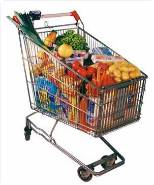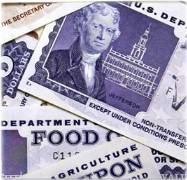FOOD STAMPS APPLICATION - SNAP PROGRAM

The Food Stamps Application or SNAP - Supplemental Nutrition Assistance Program - provides food for more than 46 Million struggling people in the US every month.
The SNAP program help individuals and families who need it the most like financially struggling individuals and families, seniors and the homeless.
The food stamp program FSP has been around since the late 1930's and has been modified throughout the years to better serve the low income population.
Navigating the food stamps application process can seem daunting, but understanding each step and being prepared can make it more manageable. By following the guidelines provided, eligible individuals and families can receive the support they need to access nutritious food.
Ensuring accuracy, meeting deadlines, and seeking assistance when necessary can help facilitate a successful application process.
Requirement and Qualification for the Food Stamps Application.
- Picture ID
- Social Security Card for all family members
- Date of birth
- AHCCCS ID numbers (when available)
- Income information, such as job, child support, (print out if currently paying or receiving) or any other sources
- Verification of lost job (If employment ended in the last 90 days)
- Resource or asset information (checking and savings accounts, homes, land, vehicles, or life insurance
- Current bank statement
- Last 3 current pay check stubs
- Letter from any source of income (family or friends assisting you by giving money or paying bills.)
- Health insurance information
- Proof of U.S. citizenship and identity for U.S. citizens
- Proof of immigration status for non-U.S. citizens
- Social Security award letter or pension letter
- Proof of recurring medical expenses for anyone in the household age 60 and older, blind, or disabled
- Residency verification (rent receipt, lease agreement and utility bill.)
FAQs About Food Stamps Application
How do I apply for food stamps?
You can apply for food stamps online, in person, by mail, or by phone through your state's SNAP office.
What documents do I need for a food stamps application?
You will need proof of identity, residency, income, and expenses.
How long does it take to process a food stamps application?
The processing time varies by state, but it typically takes 30 days from the date of application submission.
Can I apply for food stamps if I am not a U.S. citizen?
Legal non-citizens may be eligible for food stamps, depending on their immigration status and residency.
What happens if my food stamps application is denied?
You can appeal the decision by requesting a fair hearing through your state's SNAP office.
How are food stamp benefits issued?
Benefits are issued via an Electronic Benefits Transfer (EBT) card, which can be used to purchase eligible food items.
FOOD STAMP ELIGIBILITY
Household size: 1 - Gross monthly income: $1,180 (130% of poverty) - Net: $908 (100% of poverty)
Household size: 2 - Gross monthly income: $1,594 (130% of poverty) - Net: $1,226 (100% of poverty)
Household size: 3 - Gross monthly income: $2,008 (130% of poverty) - Net: $1,545 (100% of poverty)
Household size: 4 - Gross monthly income: $2,422 (130% of poverty) - Net: $1,863 (100% of poverty)
Household size: 5 - Gross monthly income: $2,836 (130% of poverty) - Net: $2,181 (100% of poverty)
Household size: 6 - Gross monthly income: $3,249 (130% of poverty) - Net: $2,500 (100% of poverty)
Household size: 7 - Gross monthly income: $3,663 (130% of poverty) - Net: $2,818 (100% of poverty)
Household size: 8 - Gross monthly income: $4,077 (130% of poverty) - Net: $3,136 (100% of poverty)
Each additional member: Add $414 for Gross and $319 for NET Income
FOOD STAMPS PROGRAM OFFICES - CONTACT
- Alabama 334-242-1700
- Alaska 907-465-3347
- Arizona 1-800-352-8401
- Arkansas 1-800-482-8988 501-682-8269
- California 877-847-FOOD (3663)
- Colorado 1-800-536-5298
- Connecticut 1-800-842-1508
- Delaware 800-464-4357302-255-9500
- District of Columbia 202-724-5506
- Florida 1-866-762-2237
- Georgia 1-800-869-1150 (outside metro area) 404-657-9358 (inside metro area)
- Guam 671-735-7245
- Hawaii 808-643-1643
- Idaho 211 or 1-800-926-2588
- Illinois 1 800-843-6154 TTY: 1-800-447-6404
- Indiana 1-800-622-4932 1-888-403-0864
- Iowa 1-877-347-5678 1-888-426-6283
- Kansas 1-888-369-4777
- Kentucky 1-800-372-2973
- Louisiana 1-888-524-3578
- Maine 1-800-442-6003
- Maryland 1-800-332-6347 - 410-767-7327
- Massachusetts 1-866-950-3663
- Michigan 1-855-275-6424
- Minnesota 1-888-711-1151
- Mississippi 1-800-948-3050
- Missouri 1-800-392-1261
- Montana 1-800-332-2272
- Nebraska 1-800-383-4278
- Nevada 1-800-992-0900 or 775-684-0615 (ext. 40500)
- New Hampshire 1-800-852-3345 (ext. 4238) 603-271-6941 local 1-800-852-3345 ext. 6941
- New Jersey 1-800-687-9512609-588-2405
- New Mexico 1-888-473-3676 505-827-7783
- New York 1-800-342-3009 Upstate 1-877-472-8411 NYC only
- North Carolina 1-800-662-7030
- North Dakota1 800-755-2716
- Ohio1-866-244-0071
- Oklahoma 405-521-3444 - 405-525-4850
- Oregon 211 or 1-800-723-3638
- Pennsylvania 1-800-692-7462 TDD 1-800-451-5886
- Puerto Rico 877-991-01011-787-724-7373
- Rhode Island 401-462-5300
- South Carolina 1-800-768-5700
- South Dakota 1-877-999-5612
- Tennessee 1-866-311-4287

- Texas 211 or 512-973-9203 option 21-877-787-8999
- Utah 1-866-526-3663
- Vermont 1-800-479-6151
- Virgin Islands 1-340-774-2399
- Virginia 1-800-552-3431 or 804-692-2198
- Washington 1-877-501-2233
- West Virginia 1-800-642-8589
- Wisconsin 1-800-362-3002
- Wyoming 1-800-457-3659
Application
Applying for food stamps can be a vital step for individuals and families in need of assistance to access nutritious food. The food stamps application process is designed to ensure that eligible applicants receive the support they need promptly and efficiently.
What is a Food Stamps Application?
A food stamps application is a formal request submitted to the relevant government agency to receive benefits under the Supplemental Nutrition Assistance Program (SNAP). This program provides financial assistance to low-income individuals and families to purchase food. Understanding how to complete and submit this application is crucial for those seeking aid.Who is Eligible for Food Stamps?Income Requirements
Eligibility for food stamps is primarily based on household income.
Applicants must meet specific income guidelines that consider household size and total income.
Citizenship and Residency
To be eligible, applicants must be U.S. citizens or legal non-citizens and must reside in the state where they apply.
Work Requirements
Able-bodied adults without dependents (ABAWDs) must meet certain work requirements to receive benefits. These requirements vary by state and individual circumstances.
Other Eligibility Criteria
Additional factors, such as household composition, expenses, and assets, can also impact eligibility for food stamps.
How to Apply for Food Stamps
Gathering Necessary Documents
Before starting the food stamps application, gather essential documents, including proof of identity, residency, income, and expenses.
Completing the Application
Applications can typically be completed online, in person, by mail, or by phone. Ensure that all sections are filled out accurately and completely to avoid delays.
Submitting the Application
Submit the completed food stamps application through the preferred method. Keep a copy for your records and note any confirmation numbers provided.
Follow-Up Interview
After submitting the application, applicants may be required to attend an interview, either in person or over the phone, to verify information and determine eligibility.
Processing and Receiving Benefits
Application Review
The relevant agency reviews the food stamps application, verifying the information provided and determining eligibility.
Approval and Benefit Issuance
If approved, applicants will receive an Electronic Benefits Transfer (EBT) card, which can be used to purchase eligible food items.
Benefits are typically issued monthly.
Denial and Appeal Process
If the application is denied, applicants have the right to appeal the decision. The denial notice will provide information on how to request a fair hearing.
Tips for a Successful Food Stamps Application
Double-Check Information
Ensure all information on the application is accurate and complete to avoid delays or denials.
Meet Deadlines
Submit the application and any requested documents by the specified deadlines.
Seek Assistance
If needed, seek assistance from local agencies, non-profits, or legal aid organizations to help with the application process.
Keep Records
Maintain copies of the application and any correspondence with the agency for your records.
Common Mistakes to Avoid
Incomplete Applications
Leaving sections of the application blank or failing to provide required documentation can result in delays or denials.
Misreporting Information
Accurately report all income, expenses, and household details to avoid potential issues with eligibility.
Missing Deadlines
Failing to meet application or documentation deadlines can delay the approval process or result in denial.
Return from Food Stamps Application to Home page.
DISCLAIMER: The law will vary depending on your state and the specifics of your case. The information provided by lawhood.com is intended for educational purposes only. All the content on this website should NOT be considered professional legal advice or a substitute for professional legal advice. For such services, we recommend getting a free initial consultation by a licensed Attorney in your State.